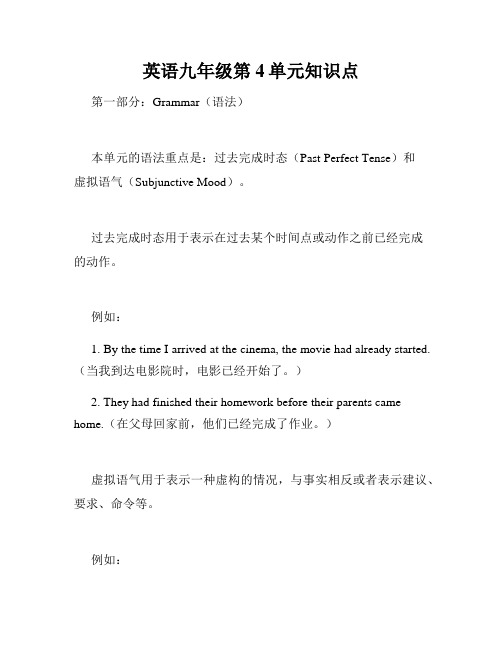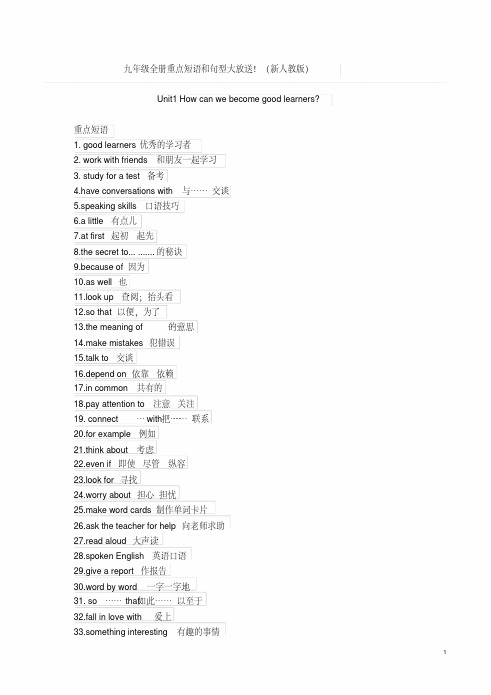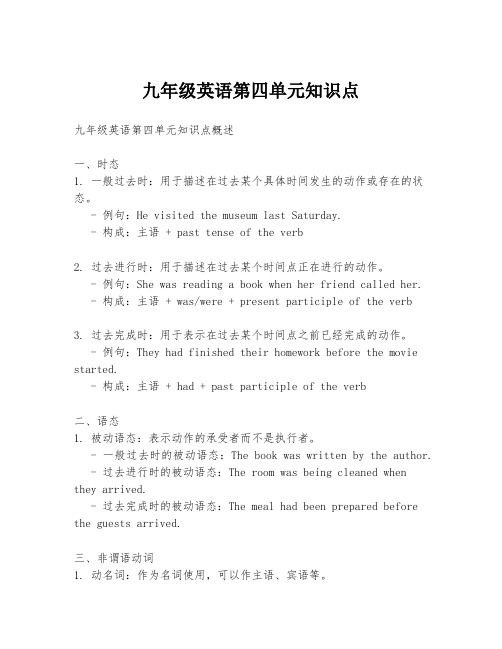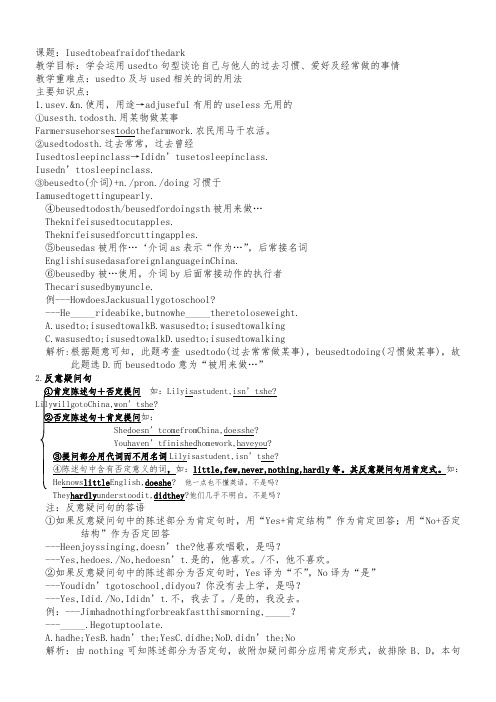2017年版新目标英语九年级第四单元重点知识点归纳
英语九年级第4单元知识点

英语九年级第4单元知识点第一部分:Grammar(语法)本单元的语法重点是:过去完成时态(Past Perfect Tense)和虚拟语气(Subjunctive Mood)。
过去完成时态用于表示在过去某个时间点或动作之前已经完成的动作。
例如:1. By the time I arrived at the cinema, the movie had already started.(当我到达电影院时,电影已经开始了。
)2. They had finished their homework before their parents came home.(在父母回家前,他们已经完成了作业。
)虚拟语气用于表示一种虚构的情况,与事实相反或者表示建议、要求、命令等。
例如:1. If I were you, I would apologize to him.(要是我是你,我会向他道歉。
)2. It is important that he be here on time.(他准时到这里非常重要。
)第二部分:Vocabulary(词汇)本单元的词汇包括常用的动词、名词、形容词和副词。
以下是一些重要的词汇和词组:1. persuade(v.)- 说服,劝说2. grateful(adj.)- 感激的3. excuse(n.)- 借口4. option(n.)- 选择5. apologize(v.)- 道歉6. request(v.)- 请求7. annoying(adj.)- 讨厌的8. temporary(adj.)- 暂时的9. assumption(n.)- 假设10. regret(v.)- 后悔第三部分:Reading Comprehension(阅读理解)本单元的主要阅读理解内容涉及两篇短文。
短文一:A Day at the Zoo这篇文章主要介绍了作者一家参观动物园的经历。
通过阅读这篇文章,我们可以了解动物园的环境和各种不同的动物。
(完整版)2017新目标人教版九年级英语全册重点短语和句型总结

九年级全册重点短语和句型大放送!(新人教版)Unit1 How can we become good learners?重点短语1. good learners 优秀的学习者2. work with friends 和朋友一起学习3. study for a test 备考4.have conversations with 与……交谈5.speaking skills 口语技巧6.a little 有点儿7.at first 起初起先8.the secret to... .......的秘诀9.because of 因为10.as well 也11.look up 查阅;抬头看12.so that 以便,为了13.the meaning of ……的意思14.make mistakes 犯错误15.talk to 交谈16.depend on 依靠依赖17.in common 共有的18.pay attention to 注意关注把……联系19. connect …with …20.for example 例如21.think about 考虑22.even if 即使尽管纵容23.look for 寻找24.worry about 担心担忧25.make word cards 制作单词卡片26.ask the teacher for help 向老师求助27.read aloud 大声读28.spoken English 英语口语29.give a report 作报告30.word by word 一字一字地31. so……that 如此……以至于32.fall in love with 爱上33.something interesting 有趣的事情1。
九年级英语全册Unit4单元短语整理(新目标英语)【DOC范文整理】

九年级英语全册Unit4单元短语整理(新目标英语)【DOC范文整理】九年级英语全册Unit4单元短语整理(新目标英语)九年级英语全册Unit4单元短语整理九年级英语Unit4if引导的非真实性条件状语从句即虚拟语气通过动词形式的变化来表示说话人对发生的动作或存在的状态所持的态度或看法的动词形式称为语气,虚拟语气表示说话人所说的话不是事实,而是一种祝愿,建议或是与事实相反的假设等。
If引导的条件状语从句分为真实和非真实条件句,非真实条句应用虚拟语气。
如果要表示与现在或将来事实相反时,其虚拟语气结构为:句型条件从句主句谓语动词形式动词过去式ould+动词原形即:if+主语+动词过去式,一般过去时主语+ould+动词原形过去将来时如:IfIhadtie,Iouldgoforaal.如果我有时间,我就会去散步。
IfIereyou,Iouldtaeanubrella.假如我是你的话,我会带上雨伞。
Iouldsaynoifsoeoneasedetobeinaovie.假如有人请我当电影演员,我会表示拒绝。
pretendtodosth.假装做某事Ipretendedtosleepjustno.pretend+从句假装…IpretendedthatIfellasleep.belatefor迟到如:Ialateforor/school/class/party.afe与alittle的区别,fe与little的区别⑴afe一些修饰可数名词alittle一些修饰不可数名词两者表肯定意义如:Hehasafefriends.他有一些朋友。
Thereisalittlesugarinthebottle.在瓶子里有一些糖。
⑵fe少数的修饰可数名词little少数的修饰不可数名词但两者表否定意义如:Hehasfefriends.他没有几个朋友。
Thereislittlesugarinthebottle.在瓶子里没有多少糖。
still仍然,还用在be动词之后,行为动词之前如:Iastillastudent.我仍然是个学生Istilllovehi.我仍然爱他。
人教新目标九年级英语unit4知识点与重点短语

Unit4 I used to be afraid of the dark.【重点短语】1. be more interested in 对…更感兴趣2. on the swim team 游泳队的队员3. be terrified of 害怕4. gym class 体操课5. worry about 担心6. all the time 一直,总是7. chat with 与…闲聊8. hardly ever 几乎从不9. walk to school = go to school on foot 步行去上学take the bus to school = go to school by bus 乘车去上学10. as well as 不仅…而且...【考点详解】1. used to do sth. 过去常常做某事(这个知识点考的很多,大家要注意这个短语的意思,还要记着used后面用的是不定式to do)如:He used to play football after school.放学后他过去常常踢足球。
2. play the piano 弹钢琴(play后面如果跟西洋乐器,大家记住,中间要加the,如果是中国乐器,不加the,如:play erhu)3. ①be interested in sth. 对…感兴趣②be interested in doing sth. 对做…感兴趣(对于这两个用法大家一定要掌握,切记切记)如:He is interested in math, but he isn't interested in speaking English. 他对数学感兴趣,但是他对说英语不感兴趣。
4. interested adj. 感兴趣的,指人对某事物感兴趣,往往主语是人interesting adj.有趣的,指某事物/某人具有趣味,主语往往是物(对于interested和interesting要区分清楚,一个主语往往是人,一个主语往往是物)5. be terrified of sth. 害怕…… 如:I am terrified of the dog.be terrified of doing sth. 害怕做…… 如:I am terrified of speaking.6. spend 动词,表示“花费金钱、时间”(spend和pay for它们的主语都是人,这一点大家要清楚)①spend…on sth. 在某事上花费(金钱、时间)(重要考点)②spend…(in)doing sth. 花费(金钱、时间)去做某事(重要考点,尤其要注意动名词,也就是动词的ing形式)如:He spends too much time on clothes. 他花费太多的时间在衣着上。
九年级英语第四单元知识点

九年级英语第四单元知识点九年级英语第四单元知识点概述一、时态1. 一般过去时:用于描述在过去某个具体时间发生的动作或存在的状态。
- 例句:He visited the museum last Saturday.- 构成:主语 + past tense of the verb2. 过去进行时:用于描述在过去某个时间点正在进行的动作。
- 例句:She was reading a book when her friend called her. - 构成:主语 + was/were + present participle of the verb3. 过去完成时:用于表示在过去某个时间点之前已经完成的动作。
- 例句:They had finished their homework before the movie started.- 构成:主语 + had + past participle of the verb二、语态1. 被动语态:表示动作的承受者而不是执行者。
- 一般过去时的被动语态:The book was written by the author. - 过去进行时的被动语态:The room was being cleaned whenthey arrived.- 过去完成时的被动语态:The meal had been prepared before the guests arrived.三、非谓语动词1. 动名词:作为名词使用,可以作主语、宾语等。
- 例句:Swimming is my favorite sport.- 结构:动词 + -ing2. 分词:- 现在分词:表示正在进行的动作,用作形容词或状语。
- 例句:The crying baby needs his mother.- 过去分词:表示被动或完成的动作,用作形容词或状语。
- 例句:The broken window needs to be repaired.3. 不定式:表示具体的动作或目的,可以作主语、宾语等。
新目标英语九年级第4单元知识点

课题:Iusedtobeafraidofthedark教学目标:学会运用usedto句型谈论自己与他人的过去习惯、爱好及经常做的事情教学重难点:usedto及与used相关的词的用法主要知识点:ev.&n.使用,用途→adjuseful有用的useless无用的①usesth.todosth.用某物做某事Farmersusehorsestodothefarmwork.农民用马干农活。
②usedtodosth.过去常常,过去曾经Iusedtosleepinclass→Ididn’tusetosleepinclass.Iusedn’ttosleepinclass.③beusedto(介词)+n./pron./doing习惯于①如果反意疑问句中的陈述部分为肯定句时,用“Yes+肯定结构”作为肯定回答;用“No+否定结构”作为否定回答---Heenjoyssinging,doesn’the?他喜欢唱歌,是吗?---Yes,hedoes./No,hedoesn’t.是的,他喜欢。
/不,他不喜欢。
②如果反意疑问句中的陈述部分为否定句时,Yes译为“不”,No译为“是”---Youdidn’tgotoschool,didyou?你没有去上学,是吗?---Yes,Idid./No,Ididn’t.不,我去了。
/是的,我没去。
例:---Jimhadnothingforbreakfastthismorning,_____?---_____.Hegotuptoolate.A.hadhe;YesB.hadn’the;YesC.didhe;NoD.didn’the;No解析:由nothing可知陈述部分为否定句,故附加疑问部分应用肯定形式,故排除B、D,本句时态为一般过去时,应用助动词did.故选C3.helpv.&n.帮助→adj.helpful有帮助的相关短语及句型:helpsb.withsth.在……方面帮助……helponeselfto随便吃……helpsb.out帮助某人解决困难helpsb.(to)dosth.帮助某人做某事withthehelpofsb=withsb’shelp在……的帮助下4.What’ssblike?意为“……是什么样的人?”,多用于提问人的性格、品质等,也可用于提问人的相貌。
九年级英语unit4知识点总结
九年级英语unit4知识点总结九年级英语Unit 4 知识点总结英语学习是学生九年级阶段的重点之一,而Unit 4作为九年级英语教材的一个单元,涵盖了许多重要的知识点。
在本文中,我将对九年级英语Unit 4的知识点进行总结,以帮助学生更好地理解和掌握相关内容。
1. 单词记忆在Unit 4中,有许多单词需要我们记忆。
例如,"succeed",意为“成功”,"annoy",意为“使人烦恼”,"distract",意为“分心”,以及"inspire",意为“激励”等等。
记忆单词的方法有很多,可以通过创造语境、制作记忆卡片或使用单词联想等方法来帮助记忆。
2. 动词时态在Unit 4中,我们学习了一些动词的时态形式,包括一般现在时、一般过去时和将来时。
对于一般现在时,我们要注意使用第三人称单数形式的动词。
例如,"She goes to school every day."对于一般过去时,我们需要将动词的过去式形式加在句子中。
例如,"She went to school yesterday."而将来时则需要使用助动词"will",并在动词原形后加上动词。
例如,"I will go to school tomorrow."3. 冠词的使用在英语中,冠词的使用是一项比较困难的语法知识。
在Unit 4中,我们也涉及了冠词的使用。
冠词分为不定冠词"a"和"an",以及定冠词"the"。
不定冠词用于泛指,而定冠词用于特指。
例如,"I saw a cat in the garden."中的"a"是不定冠词,而"the"用于特指,如:"I saw the cat in the garden."4. 句型的运用在Unit 4中,我们学习了一些常用的句型,如祈使句、感叹句和疑问句等。
新目标英语九年级Unit 4 知识要点归纳
新目标英语九年级Unit 4 知识要点归纳作者:来源:《中学生英语·九年级》2020年第10期【重点词组或短语】1. used to do 过去常常2. be used to doing... 习惯做……3. be used to do 被用来做4. pay attention to (doing) sth. 对……注意5. give up doing=stop doing 放弃做……6. instead of (doing)... 代替;而不是7. lose interest in 对……失去兴趣 8. be afraid of doing sth. 惧怕做某事9. be afraid that 惧怕…… 10. go to sleep=fall asleep入睡11. with the door open/closed 开(关)着门 12. go right home直接回家13. daily life 日常生活14. chat with sb. about sth. 和某人聊某事15. in the last/past few years 在过去的几年里16. make sb. stressed out 使某人紧张 17. all day (long)=the whole day 整天 18. in the end=at last=finally最后,终于19. to one’s surprise 令某人吃驚的是 20. even though=even if 尽管21. take pride in=be proud of对……感到自豪22. the pride of 是……的骄傲23. change one’s mind 改变某人的主意24. after his father’s death a few years ago 在几年前他父亲去世后25. can/can’t afford to buy 买得/不起……26. get into trouble 遇到麻烦 27. waste time 浪费时间28. It is necessary to do... 做……是有必要的【重难点句子】1. Let past experiences provide you with helpful advice for the future.让过去的经历为你的将来提供有用的建议。
人教新目标版九年级全册Unit4复习知识点
九年级英语新目标Unit4复习知识点1. used to do过去……(过去时)否定句:didn’t use to doget/be used to doing习惯于做某事be used to do=be used for doing被用于做某事如:他过去住在乡下,现在习惯于住在城里。
刀用来切东西。
2. be afraid of sth./ doing; be afraid to do sth.be afraid that+句子如:他害怕蛇。
他害怕夜里独自出去。
3. It’s +一段时间+since…如:他的祖父去世已经十年了。
4. deal with常与how连用;do with一般与what连用。
如:我想知道他们要如何处理这个问题。
(两个)5. so与such的区别such+ a/ an + 形容词+可数名词单数=so +形容词a/ an +可数名词单数such+形容词+可数名词复数/不可数名词如:如此漂亮的一个女孩如此新鲜的水果so想修饰名词,只能用短语:so much/ little+(形容词)不可数名词so many/ few+ (形容词)可数名词复数如:如此多的人如此少的水6. all与whole整个的(1)all可以修饰各类名词,且限定词要放在all之后。
而whole只能修饰具有整体意义的单数名词,且限定词要放在whole之前。
如:全国(2)whole不能修饰复数可数名词,但若复数可数名词前有具体的数量词时,则可以用whole。
如:整整三天7. 辨析:no longer, no more, not..any longer, not…anymore(1) no more一般用于句尾或句中,而no longer则可用于实义动词之前,助动词或系动词之后,也可以位于句首或句末。
(2)not..any longer, not…anymore中的not即否定句。
(3)not more=not…anymore,主要强调动作的重复。
英语第四单元九年级知识点
英语第四单元九年级知识点第一部分:介绍第四单元的主题第四单元是九年级英语课程中的一个重要单元,主要讲述了一些重要的英语知识点。
这些知识点涉及到词汇、语法、阅读和写作等方面。
掌握这些知识点对于学生提高英语水平、达到更好的学习效果非常重要。
第二部分:词汇知识点在第四单元中,有一些重要的词汇需要我们掌握。
其中包括一些常用的动词、形容词和副词等。
比如,"study"(学习)、"difficult"(困难的)、"quickly"(快速地)等等。
除此之外,还有一些表示时间、地点、数量等的词汇,例如"today"(今天)、"here"(这里)、"many"(许多)等。
通过掌握这些词汇,我们可以更准确地表达自己的意思,丰富自己的词汇量。
第三部分:语法知识点除了词汇之外,第四单元还包括一些重要的语法知识点。
其中之一是动词的时态。
在英语中,动词的时态分为一般现在时、一般过去时和一般将来时等。
我们需要学会根据句子的语境选择合适的时态。
此外,第四单元还包括了一些特殊疑问句的构造和使用方法,例如以“why”(为什么)、“how”(怎样)等开头的疑问句。
通过掌握这些语法知识,我们能更加准确地表达自己的意思,提高英语语法水平。
第四部分:阅读知识点在第四单元中,我们会接触到一些英文阅读材料,例如短篇故事、新闻报道等。
通过阅读这些材料,我们不仅可以了解到更多的英语单词和表达方式,还可以培养自己的阅读理解能力。
在阅读过程中,我们可以学会如何根据上下文推测单词的意思,如何理解文章的主题和要点等。
第五部分:写作知识点第四单元中还包括一些写作知识点。
在写作方面,我们需要学会如何组织自己的语言,如何使用正确的语法和词汇表达自己的意思。
此外,我们还需要掌握一些写作技巧,例如如何写一篇简单的日记、如何描述一张图片等。
通过这些写作练习,我们能够提高自己的英语写作能力。
- 1、下载文档前请自行甄别文档内容的完整性,平台不提供额外的编辑、内容补充、找答案等附加服务。
- 2、"仅部分预览"的文档,不可在线预览部分如存在完整性等问题,可反馈申请退款(可完整预览的文档不适用该条件!)。
- 3、如文档侵犯您的权益,请联系客服反馈,我们会尽快为您处理(人工客服工作时间:9:00-18:30)。
2017版新目标英语九年级第四单元重点知识点归纳I used to be afraid of the dark.一、单词盘点1. humorous adj.有幽默感的 a humorous man —个幽默的人2. humor n. 幽默a sense of humor 幽默感3. silent adj.沉默的Keep silent !保持沉默silenee n.沉默in silenee 3. helpful adj.有帮助的be helpful to… 对....... 有帮助help n.帮助I need your help.4. score n.得分;进球get a good score取得好的成绩5. backgro und n.背景6. interview v. 采访;面试interview sb. about sth. 就某事采访某人Hehas an interview for the manager 'sjob.n.面试;访谈a job in terview 一次工作面试7. Asian adj. 亚洲的;亚洲人的Asian countries 亚洲国家Asia n.亚洲We are in Asia.8. deal v.对付;对待过去式;How to deal with so many e-mails? 过去分词dealt9. dare v. 胆敢;敢于I dare to sing in front of our class.10. ton n.吨pl.大量;许多tons of11. private adj. 私人的;私密的12. guard n. 警卫;看守several guards 几个警卫v.守卫;保卫guard the house13. require v.需求;要求requirement n.需求;要求14. European adj. 欧洲的;欧洲人的Europe n.欧洲人15. Afican adj.非洲的;非洲人的Africa n.非洲人16. British adj.英国的;英国人的Britain n.17. speech n.讲话;发言give a speech; make a speech发表演说18. public n.民众adj.公开的;公众的in public公开的;当众19. ant n.蚂蚁复数ants20. seldom adv .不常;很少21.i nflunce v.影响n. 影响have an in flue nce on ….对…有影响22. absent adj.缺席be absent from 缺席absence n. 缺席23. fail v.不及格;失败;未能做到fail to do sth.未能做成某事failure n.失败The failure is the mother of success.失败是成功之母24. exam in ati on n.考试=exam pass the exam in ati on 通过考试25. exactly adv.确切地;精确地exact adj.确切的;精确的26. pride n.骄傲;自豪take pride in以...... 而自豪27. proud adj.自豪的;骄傲的be proud of以...... 而自豪28. ge neral adj.总的;普遍的;常规的n.将军29.introduction n.介绍make an introduction 做一个介绍introduce v. 介绍Let me introduce myself.introduction n.说明Please read this introduction before using the new machi ne.、重点短语以及句型结构1. be afraid of doing sth/ be afraid to do sth 害怕做某事,2. I'm afraid that …..我恐怕…..,I'm afraid not.我恐怕不行。
3. -What is sb like -sb.+be+funny ( 描述性格的单词 )某人是怎样的一个人(指人的个性)4. -What does sb look like ?-sb.+be+short (描述外貌特征的单词)某人长什么样子(指人的外貌)5. keep silent =in silence 保持沉默6. brave enough 足够勇敢 enough 放在形容词副词之后名词之前 enough food/money 接动词时用动词不定时 He 'sold enough to go to school.7. be on a swim team 在游泳队里 be on the soccer team 加入足球队8. from time to time=sometimes= at times 9. such+a/ an+形容词+单数名 词=so+形容词+a/an+单数名 词,so+ma ny/ few+ 复数名词,so+much/little+ 不可数名词, such+其 他形容词 +复数名词或不可数名词 10.It is 或has been+—段时间+since 从句,(从句必须用一般过去时例: It is/ has been three years since I met you.有时态,必须为肯定句)11.turn+ 颜色 例:turn red, 变红, turn 为联系动词 12.get good scores 得到高分 13. see sb doing sth 看见某人正在做某事14. see sb. do sth 看见某人做过某事15.take up doing sth 开始做某事16. do with与what连用,deal with与how 连用,处理、应付17. dare to do sth 敢于做某事18. t he whole +单数名词(whole只与单数名词连用)二all the +单数名词all the+ 不可数名词/物质名词all the money/all the bread19. no more二not…any more “不再”程度或次数上不再增加20. no Ion ger二not any Ion ger “不再”时间上不再增加21. all the time =always 一直22. to ns of…许多的,大量的,修饰可数名词复数或不可数名词23. get the attention of sb= get one ' attention 得至U某人的关注24. at least 至少反义词at most至多25. give up 放弃give + 代词+up give up doing sth.放弃做某事26. move in with 搬来和…..一起住move to…..搬到….27. worry about= be worried about 担心28. appear to do sth 好像做某事,例:He appeared to know thean swer. appear to others 出现在别人面前29. be careful about/ of … 当心…30.private time 个人/私人时间private teacher 家教31.ha ng out with friends 和朋友闲逛32.be prepared to do sth. 准备做某事33.be prepared for sth. 为….做准备34.the road to success 通往成功的道路35.fight on 继续战斗36. r equire to do sth 要求需要做某事37. r equire sb to do sth 要求某人做某事38. the most requirement 最重要的要求39. a number of 许多的,谓语动词用复数,a large number of, 许多的,a very small number of …..极少数的the number of,….的数量,谓语动词用单数,A number of women teachers are working in our school.The number of them is forty.40.make it to the top 成功登顶European history 欧洲历史41. African culture 非洲文化British English 英式英语42.give a speech/ talk in public 当众发表演讲43.country music 乡村音乐paint pictures 画画44.be n ervous about …对…..紧张45.from the countryside 来自乡下46.do well in= be good at 擅长于…..,在…..做得好47.have difficulties/ problems/ trouble (in) doing sth 做某事有困难cause problems 惹祸have a long talk 进行一次长谈48.have a great influence on ….. 对… ..有巨大影响49.have an influence on sth. 对某人产生影响50.be absent from …. 缺席…..51. make a/ the / one's decision to do sth= decide to do sth 决定做事52. advise sb to do sth =advise doing sth53. advise+ that 从句建议某人做某事54. talk with sb in person 亲自和某人谈话55. even if / though …. 即使…56. take pride in …二be proud of …. 以….为自豪57. have communication with= communicate with … . 与…..交流58. be/ become active in …. 对/ 变得…..积极59.It 'i s mportant for sb to do sth. 做某事对某人重要60.It's helpful for sb. to do sth. 对某人来说做某事有帮助61.It's necessaryfor sb. to do sth. 对某人来说做某事有必要的62.look after= take care of 照顾a boarding school 一个寄宿学校63.fail in sth,fail sth, 在某事上失败fail to do sth 做某事64.in the last few years 在过去的几年里65. pay attention to sth pay attention to doing sth66. to one's surprise in surprise67. sb.+be+surprised sth+be+surprising68. be there for their children 和孩子们在一起69. tell jokes=tell a joke 讲笑话tell stories=tell a story 讲故事70. a 9-year-old boy an 8-year- old girl71. hate sth 讨厌某事hate doingsth /hate to do sth 讨厌做某事72.in general 通常;总的来说a general introduction 大致的介绍73. sb.+be +interested in doing sth 某人对做某事感兴趣74.Sth.+be+interesting 某事本身有兴趣75. give a general self-introduction 做一下大致的自我介绍76. give us an introduction of yourself 给我们做一个自我介绍二、Grammarl. used to +动词原形+其他表示过去习惯的动作,现在不再发生了<I used to watch TV once a week.used to be+形容词或者名词表示过去习惯的状态,现在不存在了I used to be a little child.I used to be short,肯定句结构:主语+used to+动词原形+其他否定句结构:主语+didn '+动词原形+其他一般疑问句:Did+主语+动词原形+其他?肯定回答:Yes主语+did.否定回答:No,主语+didn '.特殊疑问句:特殊疑问词+did +主语+动词原形+其他?典型例句肯定句:I used to watch TV once a week.否定句:I did n 'use to watch TV once a week.一般疑问句:Did you use to watch TV once a week?肯定回答:丫es I did.否定回答:No, I didn '.特殊疑问句:How often did you use to watch TV?肯定句:I used to watch TV once a week.反义疑问句:didn 't you?肯定句:I didn 't use to watch TV once a week.肯定句:I never used to watch TV once a week. 反义疑问句:did you? 反义疑问句遵循的原则是:先肯后否,先否后肯2. 与之搭配的相似短语(1)人. +be/get/become used to doing sth. 意为“习惯于做某事”Eg:I used to watch TV once a week, but now I am/get/become used to watching TV twice a week.Eg:I used to go to bed late, but now I am/get/become used to getting up early,⑵物+be used to do sth.意为“被用于做某事”物+be used for doing sth意为“被用于做某事” Knives are used to cut. =Knives are used for cutting .(3)be used as意为“被当作. ”The box is used as a table.语法专项训练一、用所给词的适当形式填空1. Mario used to ____ (be) afraid of flying.2. Amy used to___ (have) long straight hair.3. They ____ (not used )to wear T-shirt.4. Did Gina ___ (use) to be absent from classes?5. Mr Gao used to ___ (keep) some beautiful parrots (鹦鹉)6. My father used to___ (drive) a car. But now he is used to__ (take) a bus.7. He used to__(watch) TV after supper, but now he is usedto ___ (take) a walk after supper.8. I used to___( eat) dumplings, but these days I am usedto ___ (have) bread and milk for breakfast.9. Look at my new machine( 机器)」t ' used ____ (cut) apples.10. Mr Brown is used to ____ (work ) at night.11.I used to ___ (be) afraid of snakes.12. Mr Li used to ___( have) dinner at the restaurant ,but now he isused to ___ (eat) every meal with his family at home.13. Tom used to __(be)short, __ (did) he?14. I used to ___ (study) English by reading English newspaper, butnow I am used to ___ ( study ) English by watching an English film.15. The Greens used to live in London and now they are used to___(live)in Beijing.16. Your father used to___( eat )meat, __ (did) he?17. __ (Do)Mike___ (used) ___ (wear) a pair of thick glasses?-Yes, he did. He has short -sighted for many years.18. He used to__ (drive) a car, but now he is used to (walk) thereto lose weight.19. A knife is used ___ (cut)th in gs.20. Wood (木头)is used for ___ ( make )tables.二、按要求完成句子。
